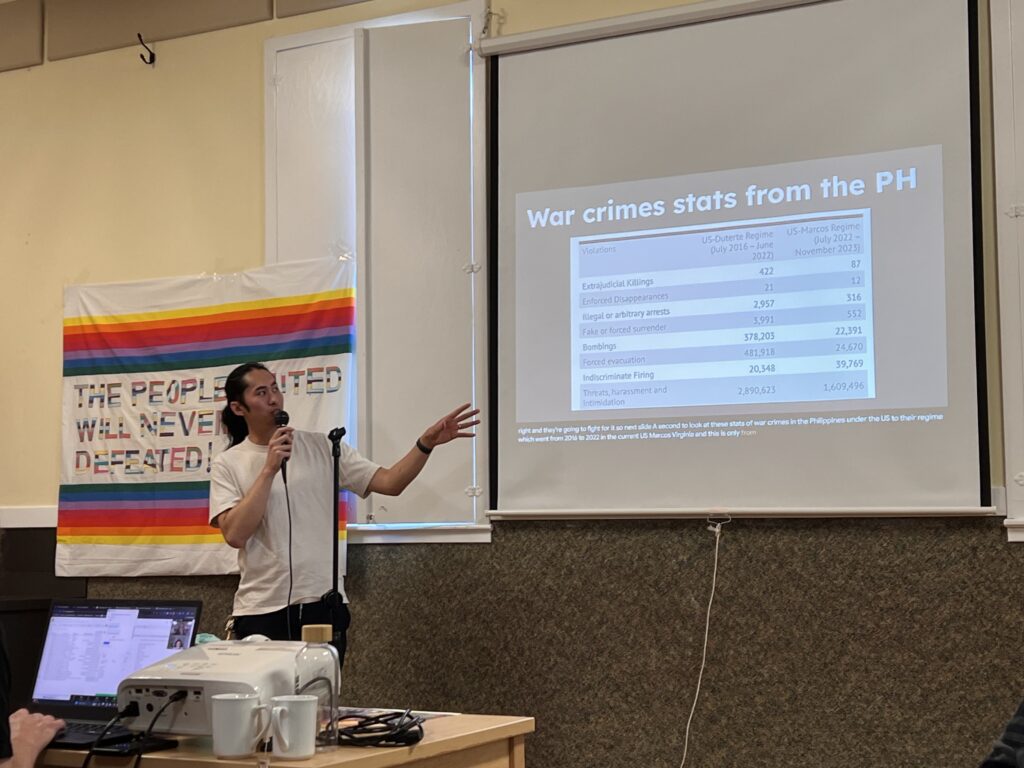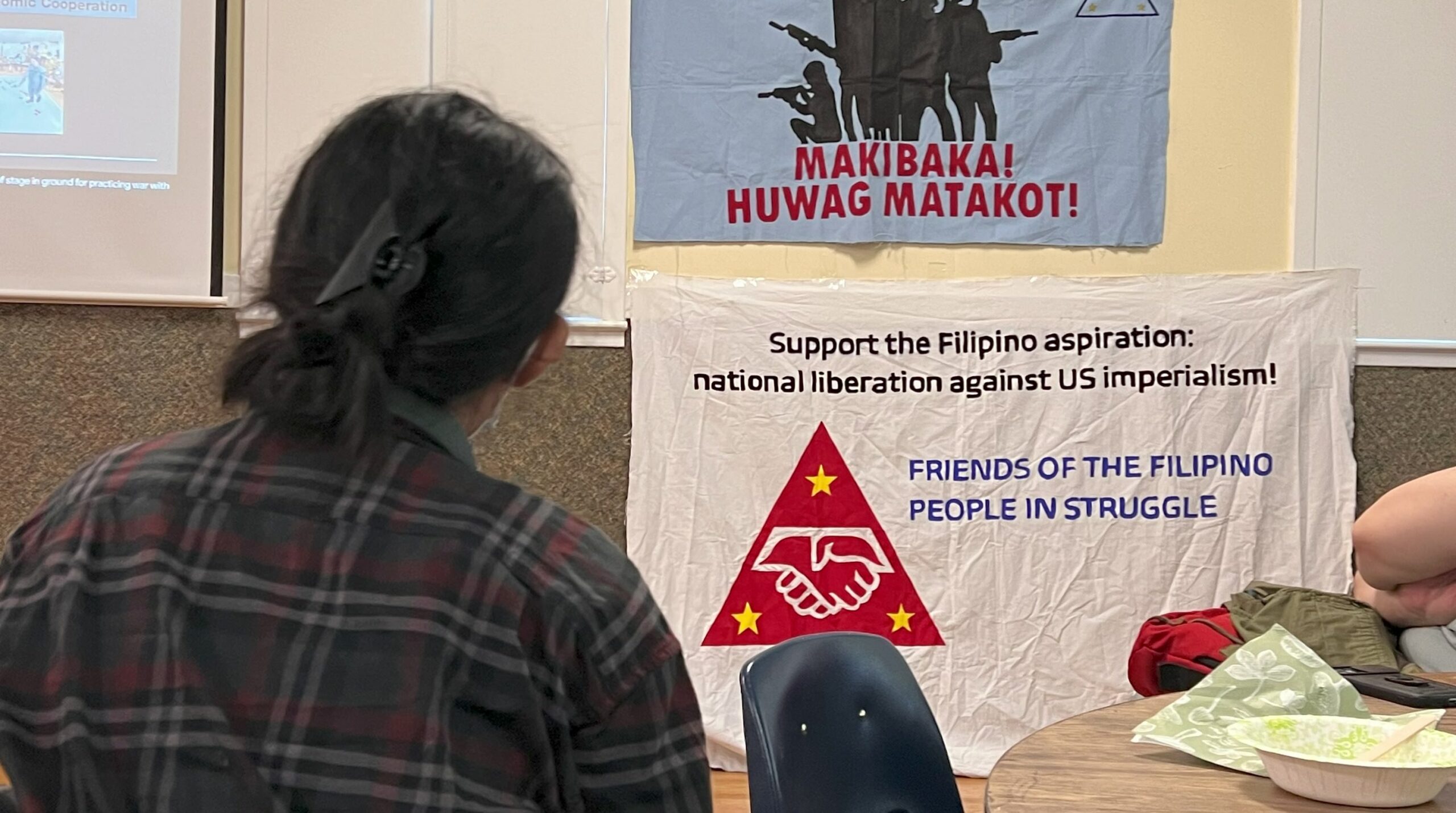The International People’s Tribunal (IPT), convened in Belgium last weekend to investigate allegations of war crimes committed by the American and Philippine governments. The quasi-judicial forum issued its guilty verdict on May 19. The significant role that Canadian elites play in this repression, however, is not as widely recognized.
Since July 2016, numerous human rights violations have been documented in the Southeast Asian country, including 509 extrajudicial executions, 400,596 bombings and 506,588 forced evacuations. A number of these are linked to Canadian multinationals.
Friends of the Filipino People in Struggle (FFPS), who convened the Tribunal, assert that the United States and its Philippine client government use the tactics of militarization, repression and violation of peoples’ rights to continue exploiting the population and plundering its lands.
These tactics are deployed against ongoing resistance from Filipino workers, farmers and indigenous communities, including a 50-year-old armed revolutionary struggle led by the National Democratic Front of the Philippines and the Communist Party of the Philippines.
Canada is closely implicated in the destruction of land and the pollution of waterways in the Philippines through highly contested agreements and investments in the mining industry, such as a deal granted to OceanaGold, an Australian-Canadian mining company. Canada holds $1.6 billion in direct investment assets in the Philippines, $843 million of which is in mining.
The extractive sector in the country has been linked to multiple human rights violations, including the killings of at least 281 environmental and land defenders since 2012, according to Global Witness, an international NGO exposing the effects of natural resource exploitation on local communities.
“As a court of people’s opinion, the IPT’s findings carry significant political and moral weight. Its significance as a people’s tribunal lies in its facility as a moral and political platform for victims, advocates, and national and social justice movements seeking justice and accountability,” explains the 2024 IPT Primer.

The IPT hearing included testimony from directly affected people and communities in the Philippines. Many of these stories are rarely heard in the mainstream media.
Jonathan, the chairperson of FFPS’s Vancouver chapter, hopes the tribunal will amplify their calls for a remedy. “The Philippines is hundreds of islands. And you don’t hear all these massacres and all these crimes from all over. It’s really disconnected at times,” he said in an interview with North Star.
Speaking to North Star anonymously, the general secretary of FFPS in Vancouver discussed B2Gold, a major mining company based out of Vancouver, which operates mines in Mali, Namibia, and the Philippines:
“When activists there try to fight back against the degradation of their land, they are attacked by paramilitary forces that are aligned with the Armed Forces of the Philippines and that have an interest in protecting the economic interests of the ruling class there.”
In addition to Canadian companies’ leading role in the mining sector in the Philippines, Canada and the Philippines have increasing military ties. This is due to the countries’ important role in the Anglo-American alliance’s attempt to contain Chinese influence in the region.
In January, Canada and the Philippines signed a memorandum of understanding on military cooperation, which the Philippines’ defence minister said could lead to a troop pact in the future. “That includes over $2 billion of investments into the Philippines [by Canada], a third of it being militarily oriented,” the general secretary of FFPS added.
Canada holds large stakes in the military arms manufacturing industry and subsidizes major players in the sector, including Lockheed Martin, Bell, and Northrop Grumman:
“It also provides the point of sale for those through the Canadian Securities Commission, CANSEC. This is a huge trade show in Ottawa happening every year where these companies come and sell their arms to fascist nations like the Philippines, like Israel, a major one being Elbit Systems.”
Canadian investment in arms manufacturing and the military cooperation between the two governments highlight Canada’s role in the repression of Filipino people who are fighting against the companies encroaching on their basic human rights.
The chair of FFPS explained that “the Armed Forces of the Philippines directly attack its people with [these weapons]. And we know that the Canadian military is going to be there training the Armed Forces of the Philippines.”
The chairperson continued, “[The IPT] is a tool of the Filipino masses to really show the fascist character of the current puppet regime in the Philippines on an international scale.”
He added, “These proceedings, while not legally binding, could result in tangible physical reports like documentation that this generation and generations to come will be able to use to call out the violence of the capitalist state, of the imperialist state, and call for a just and lasting peace and a just future with a government that can be from, by, and for the people.”
Violations of International Humanitarian Law under the Duterte and Marcos regimes
| Violations | Duterte Regime (July 2016 – June 2022) | Marcos Regime (July 2022 – November 2023) |
| Extrajudicial killings | 422 | 87 |
| Enforced disappearances | 21 | 12 |
| Illegal or arbitrary arrests | 2,957 | 316 |
| Fake or forced surrender | 3,991 | 552 |
| Bombings | 378,203 | 22,391 |
| Forced evacuations | 481,918 | 24,670 |
| Indiscriminate firing | 20,348 | 39,769 |
| Threats, harassment and intimidation | 2,890,623 | 1,609,496 |

